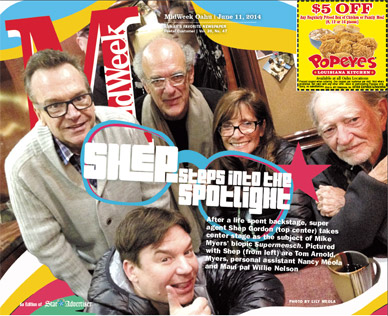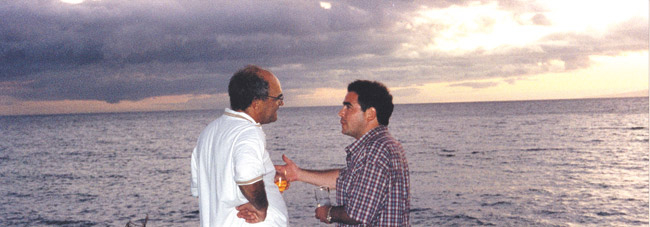Shep Steps Into The Spotlight
On Shep Gordon’s first night in Los Angeles in the late 1960s, he got hit in the face by Janis Joplin.
He had checked into the Landmark Motor Hotel without knowing that it was a low-key gathering place for the rock elite. Gordon was relaxing in his room when he heard what he thought were sounds of distress by the pool. He ran down there and attempted to save Joplin, whom he thought was being attacked. He was just trying to help. Only Joplin wasn’t being attacked. She was having sex, and Gordon broke up the action. So she hit him.
mw-cover-061114-shepgordon_4
The next day, Joplin apologized to Gordon and introduced him to Jimi Hendrix, who gave him some off-the-cuff advice that would shape the rest of his life:
“He said, ‘You Jewish?’ And I said, ‘Yeah.’ And he said, ‘You should be a manager,” recalls Gordon. “So I became a manager. You can’t argue with Jimi Hendrix.”
Hendrix introduced him to The Chambers Brothers, who in turn introduced him to an act that happened to be looking for a manager: Alice Cooper.
That was the beginning of a long, fruitful career for Gordon as a prolific entertainment manager and his foray into the world of music and celebrities as a sort of behind-the-scenes guru. He’s worked with some of music’s biggest names, and his list of friends reads like a who’s who in entertainment. Yet Gordon has managed to stay behind the curtain and out of the spotlight — until now.
Mike Myers makes his directorial debut with the documentary Supermensch: The Legend of Shep Gordon, which offers an intimate look at Gordon’s life and work through the lens of a director whose admiration and love for his subject shines through. (Mensch is a Yiddish word that means “a person of integrity.”) The film provides disarmingly forthcoming interviews with Gordon himself, as well as a parade of celebrities including Tom Arnold, Michael Douglas and Sylvester Stallone, who line up to sing his praises (although Douglas does joke that Gordon can be a motherf—-at times). Sure, it is a fun romp through a thrilling era of rock ‘n’ roll alongside one of the biggest bands of the time. But at its core, Supermensch is an ode to friendship, a sober reflection on what happens when the party is over and, more than anything, a think piece on what is really important in life.
“I have been on the road for 10 weeks. I haven’t been home since then,” Gordon says over the phone from L.A. “Home” these days for Gordon is largely Kihei, Maui, where he has had a house since the 1970s. He has been touring with Supermensch, hitting the film festival circuit for screenings in San Francisco, London, Austin and a blur of other cities. It was released last week in New York and L.A. and played June 4 at the Maui Film Festival, where Gordon was recognized with the event’s Maverick Award. It is tentatively scheduled to play at Kahala Theatre starting July 2. Supermensch has been garnering a generally favorable critical reception, and Gordon is happy it’s doing so well. Still, he’s looking forward to his next stint at home on Maui, which will be just a few days before he takes off again to promote the film.
Gordon has helped propel the careers of not just Alice Cooper, but also a slew of other widely varying artists. Locally, he is credited with being a driving force behind the now ubiquitous Hawaii Regional Cuisine movement. And along with rock ‘n’ roll did come sex and drugs. (In the film, Gordon admits that his days on the road with Alice were fueled by a barrage of substances. And, he assured over the phone, the “No Head No Backstage Pass” shirt that he used to wear was not just in jest: “Those were the early days of Alice, and we were moving from city to city, and there was absolutely no time for any playing around, except maybe a real quickie. Honesty was always really important to me, so I thought this was the most honest thing I could do.”) But any hedonistic tendencies were tempered by his seemingly compulsive desire to be compassionate — in both his career and his life — and to help others when he could.
“I just try to have winners and winners,” Gordon says. “I try to do an extra little bit of work to make sure that everybody sort of wins, and there is not a winner and a loser. You can’t do it all the time, but I try.”
Now, thrust into the spotlight for the first time, Gordon is becoming a star in his own right. What will that mean?
When Gordon first checked into the Landmark, he wasn’t trying to rub shoulders with musicians. He simply was looking for a place to crash while he figured out his next step after quitting his job as a probation officer after one day. He had just moved to California from New York, where he had grown up in one of the first Long Island suburbs — a safe, tight-knit community where the neighbors all knew each other, the kids could play outside and Gordon ran a paper route. He studied sociology at University at Buffalo before heading west.
By both of their accounts, Gordon and Cooper had an instant connection.
“There are certain moments in your life where your instincts sharpen and tell you what to do,” Cooper says. “When I met Shep, I knew he was one of us.”
When they met, the band hadn’t been in L.A. long and hadn’t seen a lot of success. They’d had a good run in Phoenix, where they had formed as high-schoolers. But L.A. audiences didn’t seem to appreciate the particular brand of performance. Rather than airbrushing the band’s image, Gordon egged them on, encouraging onstage antics that included simulating executions with guillotines or electric chairs, Cooper wrapping himself in a 15-foot-long snake and doing unspeakable things to baby dolls.
“Shep was the guy from the outside who was smart enough to see what was great about the band and emphasize that,” Cooper says. “He understood what the audience reacted to. And the more negative press we got in the beginning, the bigger we got.”
Cooper took off, with hit songs like School’s Out and I’m Eighteen.
With Alice Cooper gaining mainstream success, Gordon sought new challenges, taking on clients that included singers Anne Murray and Teddy Pendergrass, bands Blondie and The Pointer Sisters, and actress Raquel Welch. He launched his own company, Alive Enterprises, which also produced films.
In the mid-1970s, Gordon spent a couple weeks in Honolulu to take a break from the L.A. scene. Local music promoter Tom Moffatt, who had met Gordon through a mutual friend, happened to be putting on a show on Maui, so he took Gordon with him.
“Shep just fell in love with Maui immediately. He is just a genuine person, and he is a nice person, and he is very giving,” Moffatt says of Gordon, whom he calls a “dear friend.” “He has a great aura about him. He is somebody you like from the moment you meet him.”
Within days of that show, Gordon bought a house in Kihei — the same one he lives in today.







